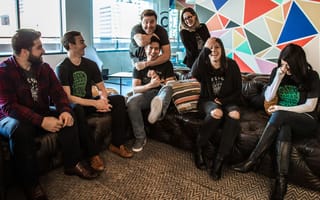For designers at leading Fortune 100 companies like Disney, IBM and Apple, it’s crucial to be able to create new products quickly, efficiently and collaboratively.
InVision, a New York-based startup with remote workers in more than 14 countries and major U.S. cities (including Boston), offers a unique product design platform that lets talented designers do just that.
With InVision’s platform, over two million employees around the world can collaborate and build interactive, realistic web and mobile mockups and prototypes, and provide feedback on those products in real time.

InVision relies heavily on its sales team to find new clients and work with existing customers. As Chris Hemberger, InVision’s senior director of commercial sales, said, “We’re often talking to people who know the product really, really well already and love it, so we’re digging into what they need as a business.”
To meet these tenacious companies’ needs, InVision’s sales people must be self-starters with an eagerness for collaboration and the design world.
That doesn’t mean InVision’s sales workers don’t know how to have fun. The group routinely partakes in virtual happy hours and team bonding outside of work hours.
Just this summer, the Boston sales team spent a day working at the VP of sales’ house on the Cape. Hemberger said they caught lobsters, went kayaking and played spike-ball.
We caught up with Hemberger and a few members of InVision’s Boston sales team — including sales development representative Adriana Spicer, enterprise solutions account executive Brian Tino and Tyler Stratton, who works in enterprise customer success — to get an inside look at what it's like working for this successful tech startup. Oh, and did we mention all InVision employees get unlimited Starbucks gift cards?
What are some of your day to day roles and responsibilities at InVision?
AS: I take care of the inbound channel, so any leads coming through the website. I’m always looking to expand InVision usage. I reach out to folks and qualify them with phone calls through 20-minute conversations to gauge their interest and see how promising they are. After qualifying them, I hand them off to account executives to dive into enterprise.
BT: From an account executive perspective, I’m tasked with closing new business for the organization — sometimes through inbound channels, but we may do outbound prospecting too. From there, I manage the rest of the sales process from trial to pitches and presentations to contract negotiation. My days are structured depending on who my client is but I mostly do external calls.

What is the sales team culture like at InVision?
BT: We sell a collaboration tool for design teams. Collaboration also describes our sales team. We very frequently share best practices for how to handle different things like an email template that worked for me I’ll send out. We succeed as a team, not as individuals.
CH: Because the team is so distributed with people all over the country, we err on the side of over-communication and collaboration when talking about tactics and strategies that work well. There’s very little micromanagement when things are going well. We look at data but use it only when necessary; we’re less focused on hammering the drum on data and statistics.
TS: There is a lack of bad politics here. No one won’t do something because of personal goals. People are willing to help where they can and where it needs to happen.
What does InVision look for in potential employees?
CH: InVision is a brand. We’re a creative company selling to creatives. We push to be super authentic and really relatable in how we reach out to people. We take formality out of emails when sending out messages. We’re very colloquial. We look for reps who embody that and can shake off formality and be more casual in their approach with customers.
BT: We’re going to hire people we want to hang out with. Not uptight structured professionals. We hire people with interests beyond work. On our team, there are a bunch of musicians and foodies.
Another big factor in hiring we’ve got is criteria we use across the team. At the end of every interview, we ask ourselves, “After one year of being hired, does this person have the potential of being in the top 25 percent of our team?” The goal is to hire better and better people and raise the bar for our team. As the talent of our team rises, we attract more and more talented people.
What is unique about the sales team at InVision?
TS: This is the first sales organization I’ve worked at where the product is that good. People love InVision. People are genuinely passionate about the product and we do a lot to advocate for design.
There’s also a level of integrity here that I’ve never seen in other sales culture. The CEO still weighs in on how he wants us to communicate with clients and takes away the standard sales tactics.
CH: Yeah, there’s definitely a tacit ‘no asshole policy’ when hiring. Employee happiness is super important. We even have a director of employee happiness; he was one of the first hires and he’s a certified life coach. He sends employees presents on their birthdays and mood maps once a week.
Any current goals or projects the team is working on?
BT: Sales people have Salesforce, engineers have Github and we want to be the de facto platform every creative team uses. We’re also trying to reach other stakeholders in companies; our core focus is expanding our types of users.





_0.jpg)
